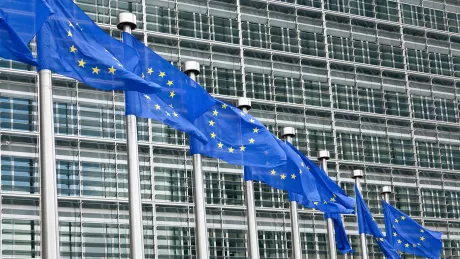
A digital identity in your wallet: What Germans think about the online ID function
published on 19.11.2020
The online ID function of the ID card can save Germans many time-consuming trips to public authorities. That being said, Germans are rather ambivalent when it comes to their own digital identity. This was the finding of a survey conducted by Bundesdruckerei. Why is that? And could a mobile identity on a smartphone be the solution?
The first of November 2010 brought great relief for German wallets even without any kind of tax reform. Instead, Germans began to say goodbye to their laminated ID cards. The successor card fits into any credit card slot and recently celebrated its tenth anniversary.
But the ID card is handy not just in terms of size. It can also spare Germans many a time-consuming trip. That’s all down to the so-called online ID function. It offers citizens a secure digital identity and, thanks to two-factor authentication, enables them to register vehicles, apply for student loans or view their pension information on the Internet. What’s more, users can also identify themselves for private‑sector services, for instance, in the banking and insurance sectors.
So, there are many ways to avoid waiting at a public office, to speed up application processes and to reduce paperwork at home. The fact of the matter is that the majority of Germans are aware of these advantages. In a representative survey conducted by Bundesdruckerei, 68 percent of participants said they were familiar with the online ID function. Forty percent of the total of 1,013 respondents said that they had been told about the possibilities for use directly at the citizens' office, and eight percent named family members, friends and acquaintances as sources of information. Another ten percent referred to other sources, such as the Internet or conventional media.
Still a long way to go when it comes to use
However, the number of actual users is still very low. This is because only 21 percent of those surveyed had set their personal six-digit PIN – the basis for use – and activated the online ID function. The majority (61 percent) set the PIN directly when they collected their ID card. However, only 32 percent of PIN holders stated that they had already used the online ID function and would continue to do so. Eleven percent were users, but said that they would no longer be using the function. Fifteen percent have not yet used the function, nor were they planning to do so. The majority of those surveyed who had a PIN had not yet tested the online ID function, but at the time of the survey were planning to change this.
The survey provided exciting insights with regard to the coronavirus pandemic. Those who already had experience with the online ID function were asked about whether the pandemic had prompted them to try it out or to increase its use. An overwhelming majority of 73 percent said yes. Thirty percent had used their ID card for virtual visits to public authorities, 22 percent for private business services and 21 percent for both.
Precisely because the advantages of digital identity seem so obvious in light of the pandemic, the question arises as to why people have not (yet) used their ID card on the Internet, or no longer want to, despite having activated their PIN. Almost a third of those surveyed (29 percent) complained about a lack of relevant offers. Twenty-one percent said that they prefer to shop and deal with public authorities in person. Fifteen percent complained that authentication using the ID card was too complicated, 11 percent had security concerns, and another 11 percent justified their decision stating that they did not have the necessary technical equipment.
Government as the key to secure digital identity
It is very easy to dispel people’s concerns regarding their personal data. The ID card with the online ID function is considered to be one of the most forgery-proof identity documents of all. This is also due to the principle of two-factor authentication which is so much more reliable than the combination of username and password which most Germans are familiar with when shopping online or logging into a social media platform.
Among those surveyed, the ID card is without doubt also the means of choice when it comes to digital identities. Forty-nine percent named the government as their provider of choice. Eight percent would prefer to get their digital identity from the EU, while only one percent prefer the European private sector. US companies were an option for only 5 of the 1,013 participants. As many as 29 percent did not trust any of the providers mentioned, twelve percent of those surveyed gave no response.
The smartphone as a wallet – mobile identities are coming
One other reason why people objected to the online ID function, i.e. the problem of the additional equipment needed, is in fact not really a problem for anyone in this country. Admittedly, a card reader was needed in the early years to use the ID card. Now, however, all you have to do is hold the card up to your smartphone – thanks to AusweisApp. But that brings us to the next challenge. Only 32 percent of those who were familiar with the online ID function were aware of this possibility.
But maybe that’s not so bad. After all, beginning next year, it should be possible to store the data from the ID card securely on a smartphone, transforming the digital identity into a mobile identity in the future. All that’s then needed for two-factor authentication is a phone. More than a third of those surveyed (35 percent) were certain that they would take advantage of this offer. Thirty-two percent didn’t like the concept, another third were undecided.
It might be possible to change the minds of some smartphone users in 2021 when German wallets can look forward to even more relief.






